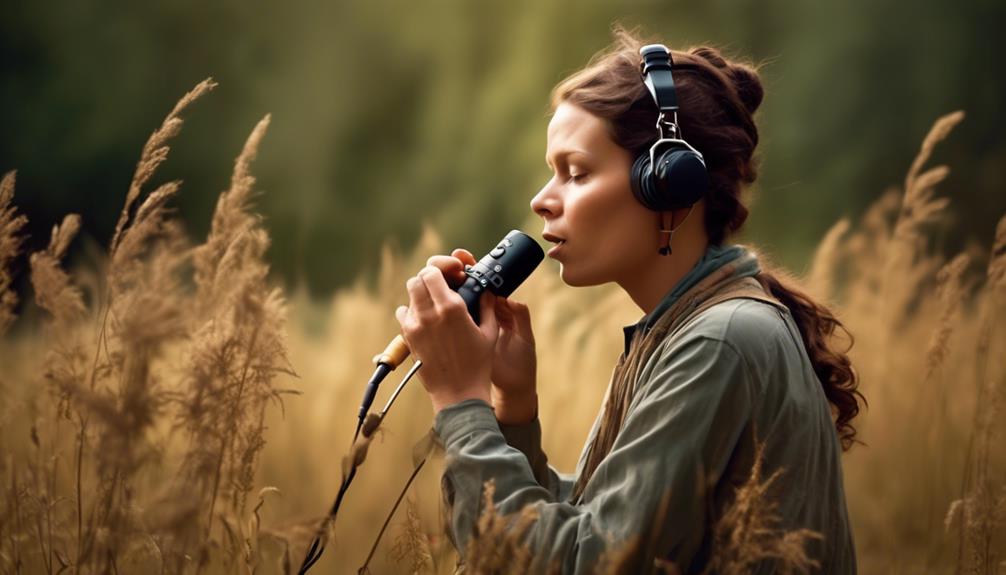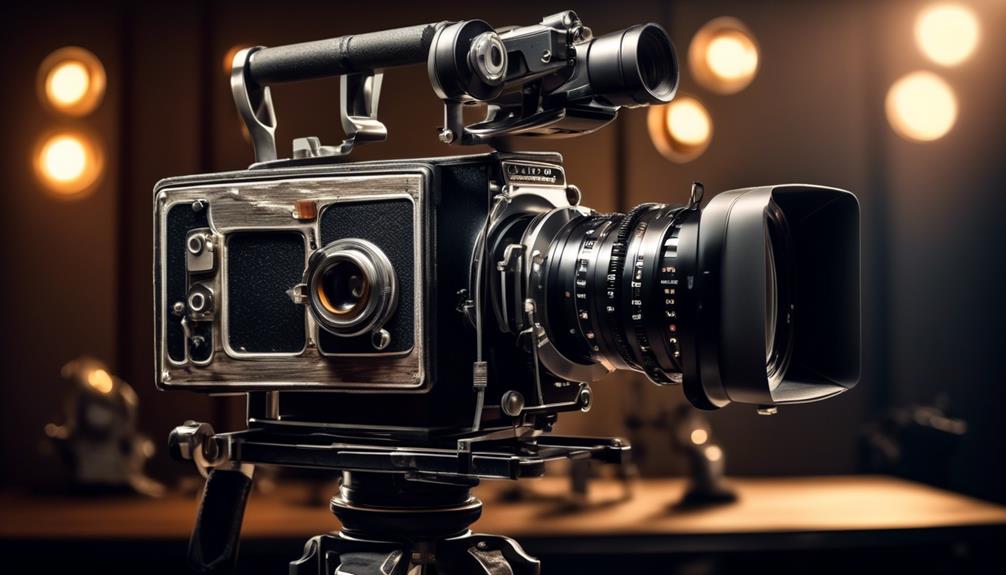Have you ever been in a situation where you wished you could record high-quality audio while on the move? That’s where the discussion about the necessity of a field recorder arises.
It's not just about the convenience of having a portable device, but also the potential improvement in sound quality. But before you make a decision, there are a few key factors to consider. Are you a content creator, journalist, musician, or sound designer? What are your specific recording needs?
Join us as we explore the benefits, versatility, and essential situations where a field recorder might just be the missing piece to your audio recording puzzle.
Key Takeaways
- Field recorders offer superior audio quality with minimized external noise and clean, high-fidelity audio.
- They provide versatility with multiple inputs for connecting external microphones and recording different sound sources simultaneously.
- Field recorders are ideal for capturing audio on the go and suitable for various recording scenarios and settings.
- They offer professional-grade audio recording capabilities in a compact and lightweight design, making them essential for outdoor audio recording, nature recording, and enhancing auditory experiences in various projects.
Benefits of Using a Field Recorder
Field recorders, with their compact design and multiple audio format options, provide unparalleled portability and versatility for capturing high-quality audio in diverse recording environments. When it comes to field recording, the portability of a handheld field recorder is unmatched. Its small size and lightweight design make it the best choice for capturing audio on the go.
Additionally, the availability of multiple audio formats, such as compressed MP3 and uncompressed WAV, ensures that the recorder can adapt to various recording needs, delivering good quality recordings in different settings.
One of the key advantages of field recorders is their ability to capture superior audio quality. Unlike onboard camera audio, sound recorders are designed to minimize external noise and capture clean, high-fidelity audio. Moreover, the presence of multiple inputs allows for the connection of external microphones, enabling the recording of different sound sources simultaneously. This feature provides flexibility and ensures that the recorder can handle diverse recording scenarios effectively.
Field Recorders for Different Professions

When it comes to professional applications, the choice of field recorders becomes essential, as different professions demand specific features and functionalities to capture high-quality audio in diverse recording environments.
Here are some considerations for field recorders tailored to different professions:
- Journalism:
- Digital recorders with built-in microphones and XLR inputs for versatility.
- Wind protection and adjustable gain levels for clear and clean audio in various reporting situations.
- Nature Recording and Sound Design:
- Handheld recorders with external microphone support for capturing outdoor sounds and nature ambience.
- Features like high-quality preamps, low noise floor, and wide frequency response for detailed and immersive recordings.
In these professions, the choice of field recorders is crucial, as they need to reliably capture high-quality audio in specific environments. For journalists, a recorder like the Zoom H4n Pro offers portability and versatility. For nature recording and sound design, a recorder with advanced features for capturing outdoor and ambient sounds would be more suitable.
Understanding the specific requirements of each profession is essential in selecting the right field recorder to meet the demands of professional field recording.
Versatility of Field Recorders
In the realm of audio recording equipment, field recorders demonstrate remarkable versatility, serving as multifunctional devices that cater to diverse recording needs. When considering the versatility of field recorders, it's crucial to understand their wide-ranging capabilities. The table below outlines key aspects of their versatility:
| Aspect | Description |
|---|---|
| Multi-functionality | Field recorders can function as standalone audio recording devices, serve as external microphones for cameras, and be used with a variety of microphones for different recording needs. |
| Portability | Their compact and lightweight design makes them ideal for on-the-go recording, whether outdoors or in studio environments. |
| Diverse application | Field recorders are suitable for capturing a wide range of sounds, from interviews and ambient nature sounds to music performances and sound effects. |
The versatility of field recorders is further highlighted by their flexibility in recording setups, offering multiple input options such as XLR, TRS, and built-in microphones. This adaptability allows for the recording of various audio sources, making them indispensable tools for professionals and enthusiasts alike. Additionally, field recorders boast features like high-quality preamps, adjustable gain settings, and support for various recording formats, providing professional-grade audio recording capabilities in a convenient package. Whether capturing field recordings for Christmas film scores or conducting on-location interviews, the versatility of field recorders makes them indispensable for diverse audio recording needs.
Situations Where Field Recorders Are Essential

For outdoor audio recording in nature reserves, parks, and urban landscapes, field recorders serve as indispensable tools for capturing high-quality soundscapes. When it comes to recording outdoor environments, field recorders are essential due to their portability, durability, and ability to capture nuanced sounds. In these settings, the use of external microphones with field recorders allows for a more versatile and high-quality audio capture.
Additionally, the availability of phantom power on field recorders enables the use of a wider range of microphones, ensuring the capture of rich, detailed sound in diverse outdoor settings.
External Microphones: Field recorders are essential for accommodating a variety of external microphones, providing flexibility and allowing for the capture of specific sounds in outdoor environments.
Phantom Power: Field recorders equipped with phantom power are essential for powering condenser microphones, enabling the capture of detailed environmental sounds with high fidelity.
When capturing the ambient sounds of nature reserves, parks, or urban landscapes, the use of field recorders becomes vital for online content creators, filmmakers, and sound engineers seeking to convey the emotional impact of classical or festive music in their projects. Whether it's capturing the magic of Christmas film scores or the festive magic in Christmas-themed content, field recorders are essential tools for recording high-quality audio that enhances the overall auditory experience.
Field Recorder Vs. Smartphone: Pros and Cons
Capturing high-quality soundscapes in outdoor environments necessitates careful consideration of the advantages and drawbacks of field recorders versus smartphones. Both devices have their strengths and weaknesses, and the choice between them depends on the specific recording needs and preferences. To illustrate this, let's compare the features of field recorders and smartphones in the table below.
| Criteria | Field Recorder | Smartphone |
|---|---|---|
| Recording Quality | Provides high-quality audio with low noise, suitable for professional use. | Limited by built-in microphones, resulting in lower audio quality compared to field recorders. |
| External Microphones | Offers multiple inputs for connecting external microphones, enabling flexibility in capturing different sound sources. | Limited or no support for external microphones, restricting recording capabilities to the built-in smartphone mic. |
| Storage | Typically equipped with SD card slots, allowing for large storage capacity and easy transfer of recorded audio. | Relies on internal storage, which may be limited and can fill up quickly, especially when recording high-quality audio. |
| Recording Capabilities | Provides various settings for precise audio recording control, such as adjustable gain, different file formats, and sample rates. Offers more advanced recording capabilities for professional use. | Limited control over recording settings, with basic options for adjusting volume or format. |
| Editing Tools | Some models offer basic editing tools on the device, facilitating quick adjustments to recorded audio. | Smartphones usually come with basic editing apps, but the functionality is often limited compared to dedicated field recorder editing features. |
When deciding between a field recorder and a smartphone for recording, it's essential to weigh these factors against specific recording needs and intended use cases. While field recorders excel in providing superior audio quality, versatile recording options, and compatibility with external microphones, smartphones offer convenience and accessibility.
Frequently Asked Questions
Why Do I Need a Field Recorder?
We need a field recorder for superior sound quality, portability, and capturing environmental sounds, professional interviews, music production, nature recording, audio journalism, field research, podcast creation, and live events.
A field recorder offers uncompressed audio formats, multiple inputs, and precise monitoring. It ensures high-quality recordings in diverse settings.
This tool is essential for achieving professional-grade audio, making it a valuable asset for various applications.
Why Do People Do Field Recordings?
Sound exploration through field recordings allows for the capture of diverse nature sounds, urban environments, wildlife recordings, and cultural preservation. These recordings provide the foundation for creating ambient atmospheres, experimental music, and environmental storytelling.
What Is the Difference Between a Camera and a Field Recorder?
The difference between a camera and a field recorder lies in:
- Audio quality
- External microphone compatibility
- Long-term storage
- Sound isolation
- Battery life
- Connectivity options
- Durability features
- Editing capabilities
- Price range
Field recorders offer:
- Superior audio quality
- More external microphone compatibility
- Longer-term storage
- Better sound isolation
- Extended battery life
- Diverse connectivity options
- Enhanced durability features
- Advanced editing capabilities
compared to cameras, albeit at a higher price range.
Do I Need Voice Recorder?
We absolutely need a field recorder for various applications like interview recordings, music production, and capturing environmental sounds.
The convenience factor and professional use of a field recorder are unmatched. It provides creative freedom and ensures top-notch audio quality, essential for sound effects and podcasting benefits.
Moreover, it's perfect for travel documentation. Investing in a field recorder is crucial for anyone serious about high-quality audio recording in diverse settings.
Conclusion
In conclusion, a field recorder can be a valuable tool for anyone who needs to capture high-quality audio on the go.
For example, a nature sound artist can use a field recorder to capture the subtle sounds of a forest, enhancing their recordings with the immersive quality that only a dedicated device can provide.
Whether you're a journalist, musician, podcaster, or sound designer, a field recorder can greatly expand your recording capabilities and elevate the quality of your work.










